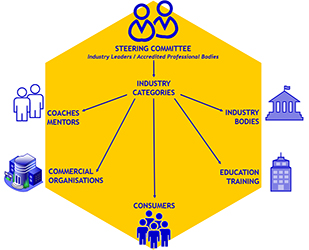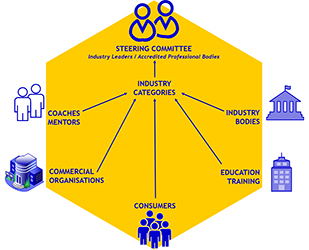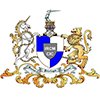.
Coaching and Mentoring Industry Direction
The IRCM‘s remit is to grow consumer confidence in the Coaching and Mentoring industry through a single internationally recognised industry code of standards, ethics, core competencies, definitions, and best practice while providing a clear direction for the industry.
The coaching and mentoring industry Leaders who are registered on the IRCM CIC’s Directories and an appointed Director from the IRCM Accredited Professional Bodies will drive the remit forward through an understanding of the issues; review, research, investigation, and industry decisions. These topics can be split into Industry Definitions, Standards, Ethics, Core competencies, and Best Practice for one or more of the following industry categories:
- Coaches and Mentors
- Education Bodies/Training Organisations
- Professional Bodies
- Commercial Organisations: Employers/Contractors/Agencies (including Directories)
- Consumers
click here to Register your issue(s)/challenge(s)
with the Coaching and/or Mentoring Industry
.

Appointments and Committee Structure:
- Industry Leaders with one Director appointed from each IRCM Accreditated Professional Body, will comprise the STEERING COMMITTEE.
The Industry Leaders will be invited by the Board of Directors.
The Director from each IRCM Accredited Professional Body will be approved by the Board of Directors.
. - A chairperson and secretary will be appointed.
These positions will:- be appointed or confirmed by the Steering Committee at the beginning of each Calendar year.
- be held for a period of no more than 5 years.
- There is an ADVISORY COMMITTEE for each industry category:
- Coaches and Mentors
Coaches, Mentors, Coaches and Mentors
- Education and Training
Formal Education Bodies, Commercial Training Organisations
- Industry Bodies
Professional Bodies, Support Groups
- Commercial Organisations
Employers, Contractors, Agencies
- Consumers
Clients, Customers, Students, Members
.
- Coaches and Mentors
- The Chairperson will, with the Steering Committee's approval, decide upon the number of members for each sub-category within their Advisory Committee.
e.g. for the Coaches and Mentors industry category, there may be a subcategory for:
(1) Coaches,
(2) Mentors, and
(3) Coaches and Mentors.- Each member of the relevant Directory will be able to apply to join the Advisory Committee.
- Approval will be given by the Advisory Committee Chairperson.
.
- Each Advisory Committee will appoint a Chairperson and a Secretary.
These positions will:- be appointed or confirmed by the Advisory Committee at the beginning of each Calendar year.
- be held for a period of no more than 5 years.
.
- Each Sub-Committee will appoint a Chairperson.
This position will be appointed or confirmed by the Sub-Committee at the beginning of each Calendar year.- The Committee Secretary will work with the Advisory Committee Chairperson and each Sub-Committee Chairperson.
Responsibilities:
The Chairperson is responsible for defining the meeting timetable, making sure that each meeting is planned effectively, conducted according to the policies/process as defined by the IRCM, allows time for each member of the Committee to have their input without one person taking over the meeting, and that matters are dealt with in an orderly, efficient manner.
The Chairperson must be able to build and lead the team.
The Chairperson is responsible for identifying and where applicable, making the final decision.
Although the Committee is responsible for creating a proposal, it is the responsibility of the Chairperson to ensure that the final decision is right for all categories of the industry.
It is important that the Chairperson does not go with the flow or vote along the same lines as others in the Committee.
When the Chairperson gives in to the group even where they disagree, it defeats the purpose of bringing Committee Members together to gather diverse opinions and perspectives.
It is more productive for both the industry category and the industry as a whole that the Committee comes to a consensus of opinion in driving the industry forward. Where a single option is not agreed upon, it is the Chairperson's responsibility to make the final decision for the benefit of the industry as a whole.
This is key to the Chairperson of the Steering Committee.
The role of the Secretary is to support the Chairperson in ensuring the smooth functioning of the Steering, relevant Advisory Committee and Sub-committees.
In summary, the Secretary is responsible for:
- Ensuring meetings are effectively organised, agendas sent within the determined timeframe, and that each meeting is minuted.
- Maintaining effective records of all members, challenges/issues, agendas, minutes, reviews, research, survey questions/responses, white paper, and all/any relevant administration.
- Communication and correspondence.
- Liaising with:
- if an Advisory Committee Secretary, the Steering Committee.
- if a Steering Committee Secretary, all Advisory Committees and all IRCM Departments as required.
- If an Advisory Committee Secretary, working with all relevant Sub-committees.
The role of each Committee Member is to support the coaching and mentoring industry in ensuring the smooth functioning of the Steering Committee, relevant Advisory Committee, and Sub-committees.
In summary, each Committee Member is responsible for:
- Understanding each challenge/issue as reported to the Steering Committee.
- Making no snap judgements.
- Allowing each person on the Committee to express their thoughts, ideas, research, review, and suggestions.
- Not voting along the same lines as others in the group, even though you disagree internally.
When one or more Committee Members gives in to the group, it defeats the purpose of bringing Committee Members together to gather diverse opinions and perspectives. - Taking time to reflect on the Committee's opinions, perspectives, research, and survey results.
- Understanding the outcomes and impacts, before making proposals.
- Supporting the industry in its goal to increase consumer confidence, providing a clear direction for the industry.
.
.
.

Policies:
Confidence and progress within an industry does not stay on track on its own.
A Steering Committee manages and guides the progress from start to finish. Whereas for a number of industries or companies the Steering Committee may steer a Board of Directors, for the IRCM the Steering Committee steers the Coaching and Mentoring industry into its future.
Steering Committees are comprised of various industry leaders and industry representatives.
For the IRCM these industry leaders will be identified by the IRCM's Board of Directors and the industry representatives will be the industry's Professional Bodies (accredited by the IRCM).
The Steering Committee is responsible for identifying the industry challenges and issues, and after a review and recommendation from the relevant Advisory Committee, making the final decision for the future of the Coaching and Mentoring industry.
Confidence and progress within an industry does not stay on track on its own.
An Advisory Committee manages and guides the progress from start to finish for a specific category within the industry, and works with the Steering Committee to steer the Coaching and Mentoring industry into its future.
Advisory Committees are comprised of individuals and representatives of industry organisations who are registered on the IRCM Directories.
The Advisory Committees work with the Steering Committee which is responsible for identifying the industry challenges and issues, and after a review and recommendation from the relevant Advisory Committee or Committees, making the final decision for the future of the Coaching and Mentoring industry.
Each Committee Chairperson will publish the Committee dates at the beginning of each calendar year.
Prepare for Committee Meetings:
- The Committee Chairperson sets the agenda.
-
A copy of the agenda will be emailed by the Secretary to all Committee Members no less than 10 days before the Committee Meeting.
This timeframe gives each Committee Member more than enough time to prepare for the meeting, where applicable adjust their diaries in order to attend the meeting, be ready to ask questions, and participate actively.- It is one of the responsibilities of the Secretary to note attendance, and where a Committee Member does not attend for 3 or more consecutive meetings, they will be asked to leave the Committee.
-
Along with the agenda, the minutes of the last meeting will be attached.
This will include an updated action list for completed actions and actions that are still in progress. -
A general progress report may also be attached which will include a summary and all relevant information.
The IRCM will provide a technology solution for each Committee to meet remotely.
A Committee is a hive of activity. Though email can help keep Committees on track, to ensure that each Committee member is not overloaded with emails and information, the IRCM will provide a Google Shared Drive for each Committee.
Sharing documents and meeting recordings in a central location makes each committee more efficient and productive during and in between meetings.
The IRCM's remit is to grow consumer confidence in the Coaching and Mentoring industry and therefore each person in the Steering Committee, Advisory Committees, and Sub-committees is responsible for this remit.
Therefore, where you are unable to commit to the level of time required, it is your responsibility to resign from the Committee explaining your reasons.
Where there is availability, the Chairperson of the Committee will not stop you from returning when you are able to commit to the level of time required.
Processes:
The beginning of the process is led by the Steering Committee:
- Industry issues/challenges will be submitted to this committee from members of the industry, consumers, others outside the industry, and the Ombudsman Service.
. - This committee will meet on a regular basis to understand and review all industry challenges/issues.
"Regular basis" will be determined by the Chairperson but will be at least once a month.
. - This Committee will review each issue/challenge to gain an understanding.
.
- The Committee will decide to which industry category the issue/challenge relates.
It is important to recognise that one issue/challenge may relate to more than one industry category, and that many submissions may relate to one issue/challenge.
. - The Secretary will forward the issue/challenge to the relevant Industry Category Advisory Committee or Committees.
The Advisory Committee process, in relation to identifying challenges/issues, determining the priority, and releasing the challenges/issues for resolution:
-
- Industry challenges will be submitted to one or more Advisory Committees by the Steering Committee.
It is important to recognise that one issue/challenge may relate to more than one industry category, and that many submissions may relate to one issue/challenge. - Each Advisory Committee will meet on a regular basis to understand and review all industry challenges/issues.
“Regular basis” will be determined by the Chairperson but will be at least once a month.
- Industry challenges will be submitted to one or more Advisory Committees by the Steering Committee.
The next part of the process is led by the relevant Advisory Committee:
 Once the Steering Committee has agreed on a challenge/issue that faces the industry, they will forward it to the relevant Advisory Committee.
Once the Steering Committee has agreed on a challenge/issue that faces the industry, they will forward it to the relevant Advisory Committee.
- Where the challenge/issue applies to more than one Advisory Committee, the Steering Committee will:
- identify the 'Lead Advisory Committee'.
- notify all Advisory Committees that are involved, that other Advisory Committees are working on the same challenge/issue, and confirm the 'Lead Advisory Committee'.
- Where the challenge/issue does not apply to more than one Advisory Committee, the Steering Committee will notify the other Advisory Committees of the challenge/issue.
- This allows each Advisory Committee to understand the current challenges/issues and to identify where there may be a cross-over.
.
- This allows each Advisory Committee to understand the current challenges/issues and to identify where there may be a cross-over.
- Where the challenge/issue applies to more than one Advisory Committee, the Steering Committee will:
- The first step for the Advisory Committee is to understand the details of the challenge/issue and within a set period of time, review and research the full details.
The timeframe will be determined by the Chairperson.
Where there is more than one Advisory Committee addressing the same challenge/issue, the Chairperson of the 'Lead Advisory Committee' will determine the timeframe.
.
- The Advisory Committee must determine whether this challenge/issue relates to their complete Advisory Committee or one or more specific sub-committees within their Advisory Committee responsibility.
For example:- does this challenge/issue relate to Coaches only, or to Mentoring only, or to both Coaches and Mentors, or
- does it relate only to Formal Education Bodies and not to Commercial Training Companies or to all education/training organisations?
.
- The Advisory Committee will undertake to research the challenge/issue, within the timeframe set by the Chairperson.
Once the review and research is completed, the Advisory Committee will identify the detail and may request input (through a survey) from all individuals/organisations registered on the IRCM Directories.
It is important that all Directories are surveyed to allow the Advisory Committee to understand the challenge/issue from all categories within the industry.- Where there is more than one Advisory Committee involved, the 'Lead Advisory Committee' will collate their detail and information before submitting their request for input through the survey.
It is important to recognise that a challenge/issue can go across one or more Advisory Committees but that, with the exception of Industry Definitions, the challenge/issue may require a different resolution for each Advisory Committee.
Therefore it is important that as the 'Lead Advisory Committee' creates the survey, they recognise that it may comprise more than one section asking the same/similar questions but with a different focus for the relevant Advisory Committee. - It is important that the survey has a set period of time allocated.
.
- Where there is more than one Advisory Committee involved, the 'Lead Advisory Committee' will collate their detail and information before submitting their request for input through the survey.
- Upon receipt of the survey results and feedback, the Advisory Committee will review the detail and collate the data.
Where the survey has included questions from more than one Advisory Committee, each Advisory Committee will receive all survey results. The same is applicable to the feedback requested.
. - Each Advisory Committee will make a decision:
- no change is required to the current Codes of Conduct, etc.
- one or more changes are required to the current Code of Conduct, etc.
.
- Each Advisory Committee will create a white paper detailing the challenge/issue, review, research, survey results, decision, and where one or more changes may be required, their proposals.
- Where the proposal is to make one or more changes, the white paper must provide an explanation to support the decision.
- Where an Advisory Committee is working on the same challenge/issue for multiple sub-categories, and the proposals are different; full details and a detailed explanation are required.
.
- Where more than one Advisory Committee is working on the same challenge/issue, each Advisory Committee will provide their own white paper detailing the challenge/issue, review, research, survey results, and proposals with full explanations to the 'Lead Advisory Committee' and the process moves to Step 9.
Where there is only one Advisory Committee working on the challenge/issue, the process moves to Step 13..
. - The 'Lead Advisory Committee' will review all white papers and makes the final decision:
- no change is required to the current Codes of Conduct, etc.
No change will only be allowed where all Advisory Committees propose 'no change'.
- one or more changes are required to the current Code of Conduct, etc.
Where one Advisory Committee recommends a change and the other Advisory Committees do not recommend a change, then the 'Lead Advisory Committee' will recommend the change providing the explanation that only one Advisory Committee recommended the change, where all others did not.
.
- no change is required to the current Codes of Conduct, etc.
- The 'Lead Advisory Committee' creates a single white paper for publication.
. - The 'Lead Advisory Committee' shares its white paper with all relevant Advisory Committees, and requests that they review the white paper and provide feedback.
. - On receipt of the feedback, the 'Lead Advisory Committee':
- reviews the feedback.
- discusses all points raised.
- makes the final decision.
- if no change is required, moves to step 13.
- if a change is required:
- updates the white paper.
- on completion of the updates, moves to step 13.
.
- The Chairperson submits the white paper is submitted to the Steering Committee.
- The Secretary sends the white paper to all Advisory Committees for their records and information.
- The Secretary updates the Advisory Committee records to show that this challenge/issue is completed.
 The STEERING COMMITTEE receives the White Paper.
The STEERING COMMITTEE receives the White Paper.
.- Each member of the Steering Committee will review the White Paper in preparation for a discussion and decision.
. - At the next meeting, the Steering Committee will make a decision:
- agree with the decision taken by the (Lead) Advisory Committee.
Move to step 5.
- not agree with the decision taken by the (Lead) Advisory Committee.
Move to step 4.
.
- agree with the decision taken by the (Lead) Advisory Committee.
- Where the Steering Committee does not agree with the decision taken by the (Lead) Advisory Committee, they will:
- document their reasons.
- return the White Paper to the (Lead) Advisory Committee.
Where this White Paper involved more than one Advisory Committees, all Advisory Committees involved will be notified. - This process will return to 2: Advisory Committees for further discussion and resolution.
.
- Where the Steering Committee does agree with the decision taken by the (Lead) Advisory Committee, they will:
- where there is no change, a press release/notice will be penned and passed to the Secretary of the Steering Committee.
- where there is to be a change, a press release/notice will be penned and passed to the Secretary of the Steering Committee.
.
- The Secretary of the Steering Committee will notify:
- all relevant departments for Web page updates:
- Industry Codes of Conduct
- Industry Standards and Ethics
- Industry Core Competencies
- Industry Terminology and Definitions
- Consumers
- Ombudsman Service
- IRCM Codes of Conduct
- And any others that require updating.
- send the following to all Advisory Committees and the Communications Department for release:
- Press Release
- Notice
- News
.
- all relevant departments for Web page updates:
- The Secretary of the Steering Committee will mark this challenge/issue as completed in their records.
.
.
© 2022 International Regulator of Coaching and Mentoring CIC. All Rights Reserved
Version 4: December 2022
.
.
Currently, all information provided by and correspondence with the IRCM is in English.

